Menopause
- Functional Medicine: Functional Testing & Treatment Plans Tailored To Your Unique Needs
- Nutritional Guidance: Bespoke Nutrition Plans & Supplements For Weight Loss & Overall Wellbeing
- Holistic Support: Comprehensive Care Addressing Your Physical, Psychological & Emotional Needs
MENOPAUSE TREATMENT
Reclaim Your Body, Embrace Vitality
At WeightMatters, we understand that menopause can be a challenging journey, marked by hormonal fluctuations and a range of physical and emotional symptoms.
Our team of specialists have extensive experience in women’s health and menopause and have helped countless women navigate this transition with confidence and ease.
Many women struggle with the following symptoms during menopause:
- Weight gain and difficulty losing weight
- Changes in appetite and cravings
- Disordered eating patterns and a negative relationship with food
- Low mood, anxiety, and irritability
- Fatigue and sleep disturbances
Our multi-disciplinary team of nutritionists, therapists, private GPs, and psychiatrists work collaboratively to create bespoke treatment protocols tailored to your unique needs. We address the root causes of your symptoms using a combination of evidence-based interventions and holistic therapies.

NUTRITION
Personalised nutrition plans and supplement recommendations to support hormonal balance, weight management, and overall well-being.

THERAPY
Cognitive behavioural therapy (CBT) and other therapeutic approaches to address emotional eating, body image concerns, and mood disorders.

PRIVATE GP
Hormone replacement therapy (HRT) and medication management to alleviate menopausal symptoms and support weight loss.

PSYCHIATRY
Specialist mental health assessment and medication management for complex mood disorders and psychiatric conditions.
Don’t let menopause hold you back from living a full and vibrant life. Our compassionate team is here to support you every step of the way.
Take action today and let us create a bespoke menopause programme that empowers you to reclaim your health, restore your wellbeing, and embrace this new chapter with confidence.
Call us today to get your programme started.
It’s Time.
TAKE CONTROL OF YOUR HEALTH TODAY – WE ARE HERE TO HELP
Struggling with weight and eating challenges? You don’t have to face it alone.
Our compassionate team is ready to listen, support, and guide you toward a healthier, happier life.
Book your free call now and take the first step.
OUR FEES
Our initial consultation is free of charge, with health coaching sessions starting from £90, therapy sessions at £120, and nutrition consultations from £200.
Health packages and multi-session bundles available – we’ll guide you to the most suitable option when we speak.
MEET CHRISTINA & HEAR HER STORY
Christina describes how she has changed her relationship with her body, found more balance in life, and improved her health and wellbeing.
Petra – Do You Resonate With Her Story
Petra, 51, has struggled with weight management her entire life. Now, as she navigates menopause, her challenges have intensified. Her periods have become heavy and unpredictable, and she’s experiencing frustrating weight gain despite her conscious efforts to eat healthily.
Petra’s once-balanced mood has given way to frequent swings and irritability, straining her relationships with her children and husband. Adding to her struggles are persistent fatigue and brain fog, making it increasingly difficult to focus on her part-time PR job.
Feeling overwhelmed and disheartened, Petra is seeking a clinic that can offer her a natural and holistic approach to managing her menopause symptoms. She’s eager to find support in adopting healthier eating habits, incorporating supplements, and addressing her mental health concerns.
Petra’s primary goal is to regain control over her body and mind, and to embrace this new phase of life with confidence and well-being.
Weight Loss & Menopause
Weight Loss & Menopause: Understanding the Challenges
During and after menopause, weight loss can become more challenging due to a combination of hormonal shifts, lifestyle factors, and metabolic changes.
Hormonal Changes:
- Decreased Oestrogen: As oestrogen levels decline, the body may redistribute fat to the abdominal area, making weight loss more difficult.
- Metabolic Slowdown: Age-related muscle loss and hormonal fluctuations can slow down metabolism, resulting in fewer calories burned at rest.
Lifestyle Factors:
- Stress & Sleep Disruptions: Stress and poor sleep, common during menopause, can lead to increased cortisol levels and unhealthy food cravings.
- Reduced Physical Activity: Age-related decline in physical activity and energy levels can contribute to weight gain.
Other Factors:
- Insulin Resistance: Menopause can increase the risk of insulin resistance, making it harder for the body to use insulin effectively, which can lead to weight gain.
- Thyroid Dysfunction: Thyroid problems can also contribute to weight gain during menopause.
Our experienced team works collaboratively to support you as and when you need it. Reducing symptoms, prioritising self-care and lifestyle modifications, and finding a more positive mindset will all help you manage menopause and your weight with greater ease.
Functional Testing
Hormone testing, from a functional medicine perspective, allows us to provide more targeted support, by giving us insight into your ovulation, cycle length, and hormone status. This information helps our hormone specialists create personalized nutrition and lifestyle interventions to reduce your symptoms, rebalance your hormones, and help you feel better.
How Can Testing Help Me?
The tests that will benefit you most depend on your symptoms and your stage of menopause. If you’re in early perimenopause and are experiencing hormonal symptoms, testing can help us understand your hormone status, enabling us to target specific nutritional and lifestyle interventions to restore balance and achieve your health goals. Functional hormone testing helps identify the root causes of hormonal imbalances in both men and women. It can also provide useful insights into perimenopause and menopausal symptoms, PCOS, weight gain, fatigue, low libido, premenstrual symptoms and more.
Many women find that weight management becomes more challenging as they enter the menopausal transition, and hormonal imbalances can exacerbate these weight challenges.
We always aim to identify the root cause of your hormonal imbalance, so we consider test results alongside your presenting signs and symptoms, as well as your current diet and lifestyle.
What Sample Do You Need?
Hormones can be tested in blood, urine, and saliva, each providing different information. Our hormone specialists will discuss the available options and recommend the most suitable ones for your symptoms and health. Blood profiles may be available from your GP; we always aim to work alongside your medical team. They can also be run privately if necessary. Saliva samples measure the bioavailable fraction of the hormone and are useful for taking multiple samples, like tracking the daily circadian rhythm of cortisol in an Adrenal Stress Profile. The gold standard test for a full hormone panel uses urine samples, which can be done from home.
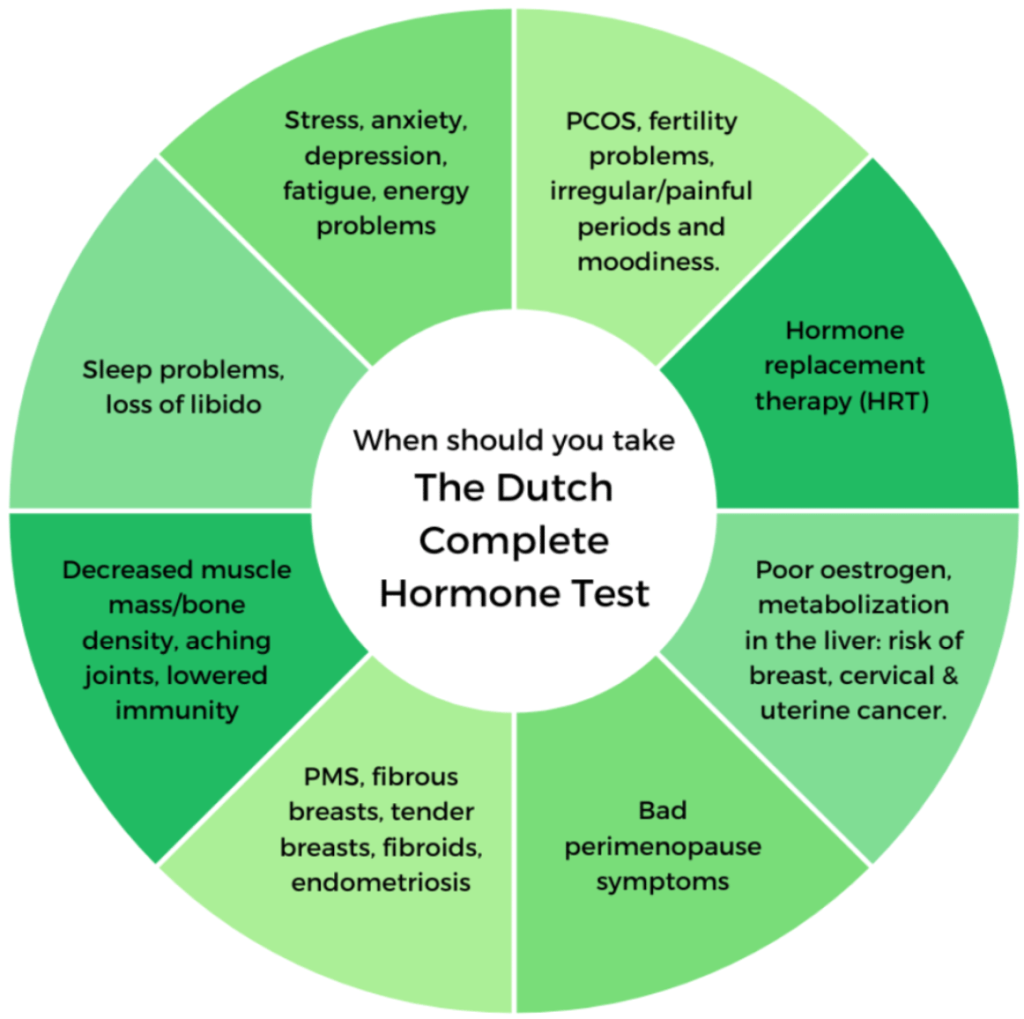
The DUTCH Profile
One of the most comprehensive hormone profiles available is the DUTCH Profile, which uses a urine sample to look at hormone pathways and metabolites — how the body processes hormones through the liver. The results provide detailed insight into the main hormones, including progesterone, estrogen and its metabolites, as well as the androgens including testosterone and DHEA, and the stress hormones cortisol and cortisone. Metabolism and excretion of hormones, which are tied to gut function, are an important, and sometimes overlooked, part of hormone balance.
DUTCH Cycle Mapping
Depending on where you are in your menopause journey, the DUTCH Cycle Mapping profile maps the progesterone and estrogen pattern throughout the menstrual cycle. DUTCH Cycle Mapping with Complete provides a full picture of a woman’s cycle to answer important questions for patients with month-specific symptoms, infertility, and hormone imbalances. Our menopause specialists can discuss with you whether this would be a useful profile for you based on your current symptoms.
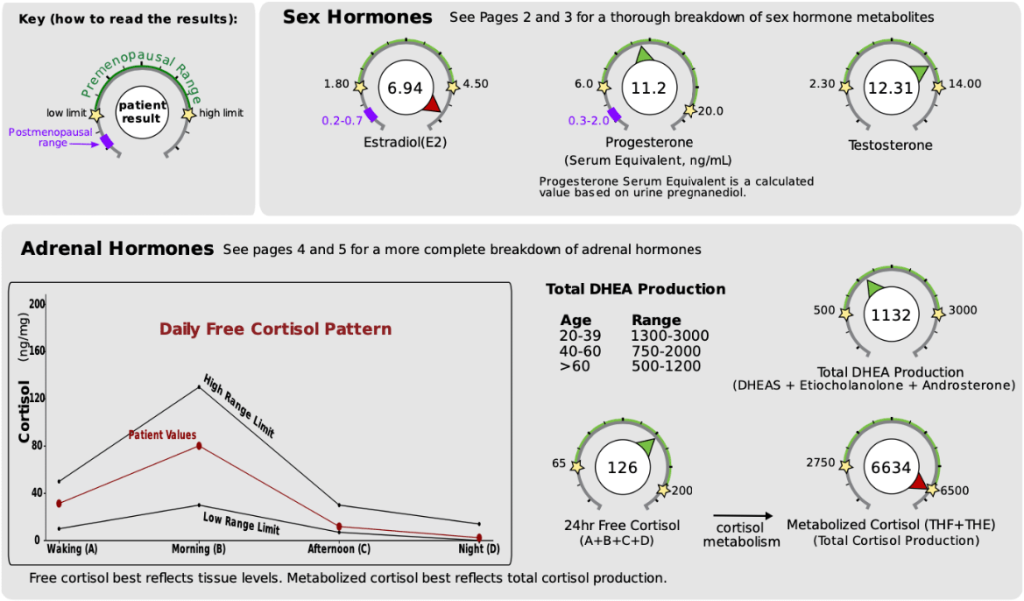
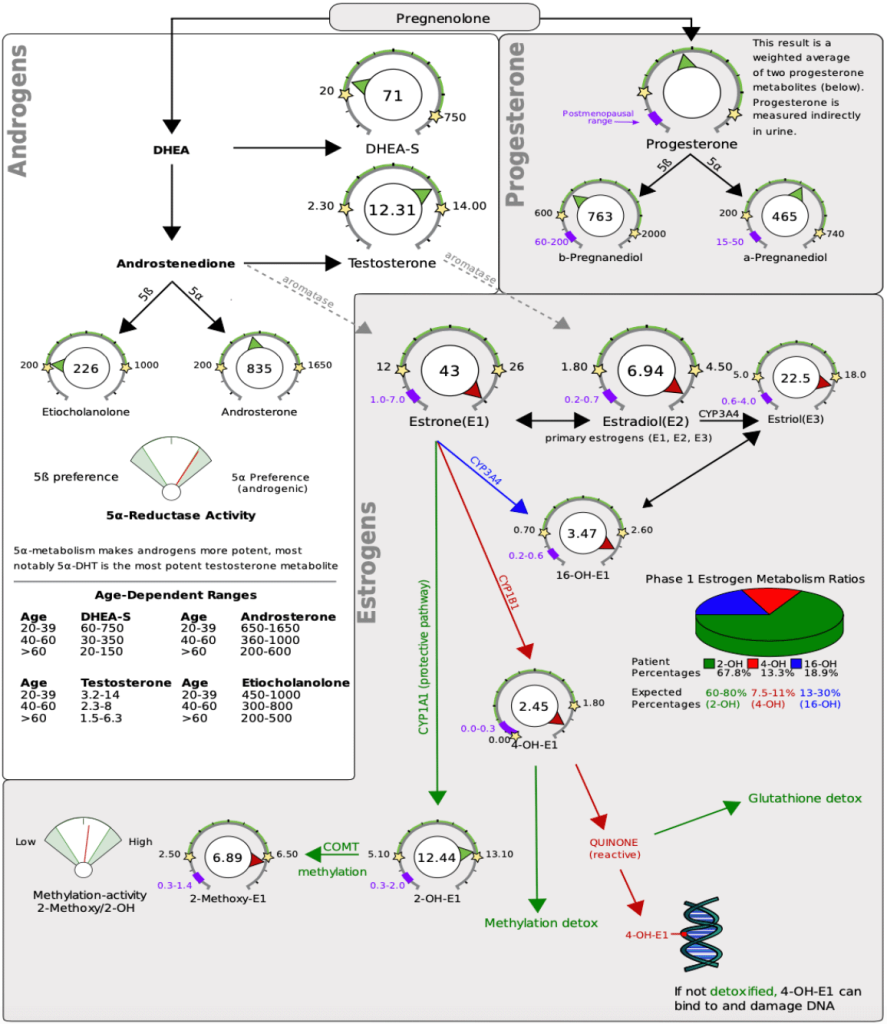
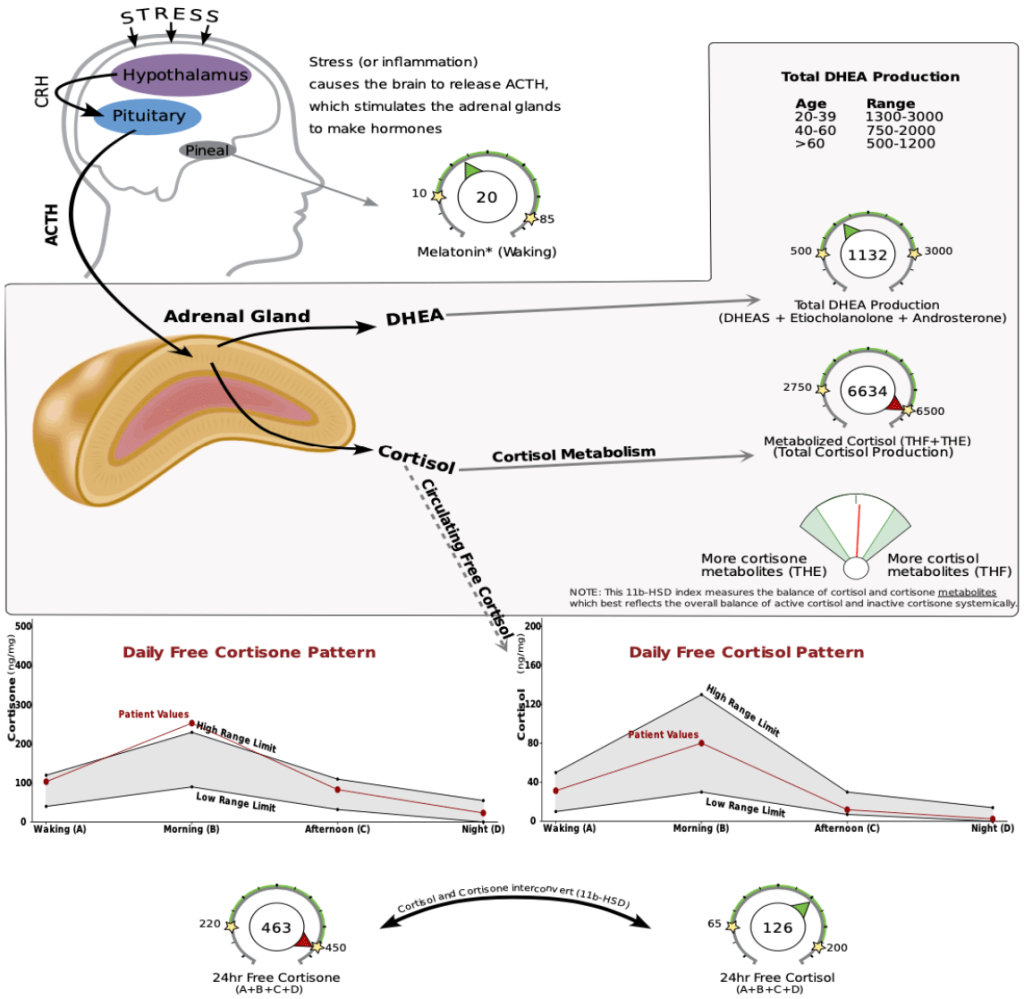
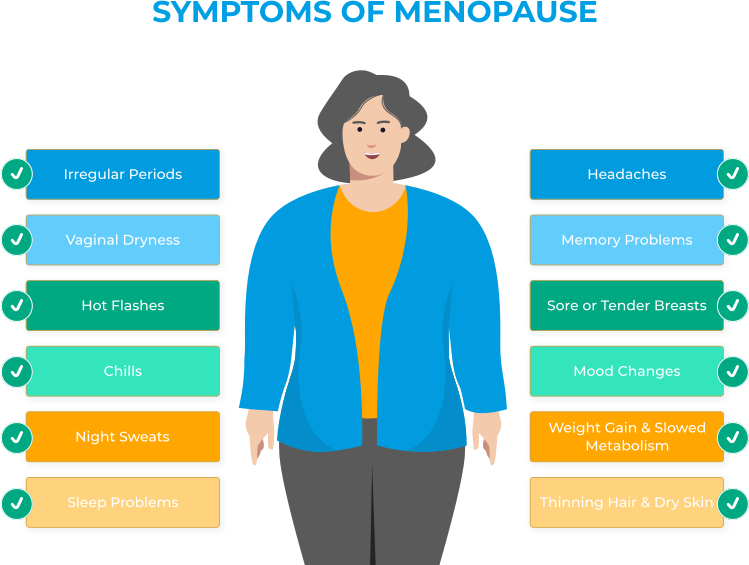
Menopause Treatment: A Holistic Approach
At WeightMatters, we understand that menopause is a complex journey, and each woman’s experience is unique. That’s why we offer a comprehensive, multi-disciplinary approach to menopause support, combining the expertise of various healthcare professionals to address your individual needs and goals.

NUTRITION
We take a holistic approach to identify the root causes of your symptoms and develop personalised treatment plans that address hormonal imbalances, nutritional deficiencies, and lifestyle factors.

MEDICAL
Our private GP can provide comprehensive medical care, including hormone therapy, to manage menopausal symptoms and optimize your health.

THERAPY
Therapists offer individual counselling to help you cope with the emotional and psychological challenges of menopause, including mood swings, anxiety, and depression.
Our Experience
With years of experience in supporting women through menopause, we understand the unique challenges you face. Our team is dedicated to providing compassionate, evidence-based care that empowers you to take control of your health and wellbeing during this transformative phase of life.
We’ve helped countless women achieve their weight loss goals, manage menopausal symptoms, and embrace a more fulfilling and vibrant life. Don’t let menopause hold you back.
Contact us today to schedule a consultation and discover how our comprehensive approach to menopause treatment can help you achieve optimal health and wellbeing.
It’s Time To Heal.
Nutrition
Our experienced team of functional medicine practitioners, clinical dietitians, and nutritional therapists play a crucial role in supporting women struggling with menopause and weight management. Here are some of the interventions they may use:
Functional Testing
- Hormone Testing: This includes measuring levels of oestrogen, progesterone, cortisol, and thyroid hormones to identify imbalances contributing to weight gain and other menopausal symptoms.
- Nutrient Deficiencies: Assessing levels of key nutrients like vitamin D, B vitamins, and magnesium can help identify deficiencies that may be impacting metabolism and energy levels.
- Gut Health Assessment: Evaluating gut microbiome health and digestive function can reveal imbalances that may be affecting nutrient absorption and overall health.
Nutrition & Lifestyle Interventions
- Personalised Nutrition Plans: Creating individualised meal plans that focus on whole, unprocessed foods, balanced macronutrients, and adequate fibre to support healthy weight management and hormonal balance.
- Supplement Recommendations: Suggesting targeted supplements based on individual needs and test results to address nutrient deficiencies and support hormonal health.
- Stress Management Techniques: Teaching relaxation techniques like mindfulness, meditation, and yoga to manage stress and improve sleep, which can positively impact weight and overall well-being.
- Exercise Guidance: Providing personalised exercise recommendations that include both cardiovascular and strength training to boost metabolism, maintain muscle mass, and support weight loss.
- Sleep Hygiene Education: Offering guidance on improving sleep quality through healthy sleep habits and routines.
For comprehensive support, our nutrition team works in conjunction with our private GP and therapists to provide a holistic approach to menopause care. This collaborative approach ensures that all aspects of your health and wellbeing are addressed, allowing you to navigate menopause with confidence and ease.
Medical
Our private GP can play a key role in supporting women navigating menopause and weight management through various medical interventions:
- Hormone Replacement Therapy (HRT)
- Prescribing HRT to alleviate menopausal symptoms and address hormonal imbalances that can contribute to weight gain.
- Monitoring and adjusting HRT dosages as needed to optimise benefits and minimize side effects.
- Medication Management
- Prescribing medications to manage weight-related conditions such as high blood pressure, high cholesterol, or type 2 diabetes.
- Considering medications that may aid in weight loss, such as GLP-1 receptor agonists, after careful evaluation of individual needs and risks.
- Mental Health Support:
- Screening for mental health issues like depression and anxiety, which are common during menopause and can impact weight management.
- Referring to a psychiatrist or psychologist for further evaluation and treatment if necessary.
- Lifestyle Counseling:
- Providing guidance on healthy lifestyle habits, including diet, exercise, and stress management.
- Encouraging regular physical activity and offering tailored exercise recommendations.
- Collaboration and Coordination:
- Working closely with other healthcare professionals, including nutritionists, therapists, and functional medicine practitioners, to provide comprehensive and coordinated care.
- Referring to specialists as needed for additional support and treatment.
Our private GPs work in close collaboration with our nutrition and therapy teams to provide a holistic and integrated approach to menopause care. This collaborative approach ensures that all aspects of your physical and mental health are addressed, supporting you in achieving your weight loss goals and overall wellbeing during menopause.
Therapy
Therapists can play a vital role in supporting women navigating the complexities of menopause, weight management, and their relationship with food. Here are some interventions and approaches they may use:
- Cognitive Behavioral Therapy (CBT) – CBT helps identify and challenge negative thoughts and behaviors around food, eating, and body image. It can also help develop coping mechanisms for emotional eating and address underlying issues contributing to unhealthy eating patterns.
- Acceptance & Commitment Therapy (ACT) – ACT focuses on accepting difficult thoughts and feelings while committing to values-based actions. This can help women develop a mindful and compassionate relationship with their bodies and food, independent of weight fluctuations.
- Mindful Eating Practices – Therapists can teach mindfulness techniques to increase awareness of hunger cues, cravings, and emotional triggers for eating. This can help women make conscious food choices and break free from automatic eating patterns.
- Body Image Therapy – Addressing negative body image and self-esteem issues that often accompany weight struggles and menopause. This can involve exploring societal pressures, challenging internalised fatphobia, and cultivating self-acceptance.
- Trauma-Informed Therapy: Recognising and addressing past trauma that may contribute to disordered eating patterns and a complex relationship with food. This can involve creating a safe space for exploring emotions and developing healthy coping mechanisms.
Addressing Deeper Themes
Therapists can also work with women to explore deeper themes that may have contributed to their complex relationship with food, eating, and weight:
- Exploring Emotional Connections to Food – Identifying how food is used to cope with emotions, such as stress, anxiety, or sadness, and developing alternative coping strategies.
- Unraveling Diet Culture Influences – Examining how societal messages about food, body image, and weight have impacted self-worth and eating habits.
- Addressing Past Experiences – Exploring past experiences, such as dieting, weight stigma, or disordered eating, that may have shaped current beliefs and behaviors.
- Cultivating Self-Compassion – Encouraging self-compassion and acceptance, recognising that weight fluctuations are normal and do not define one’s worth.
- Focusing on Health and Wellbeing – Shifting the focus from weight loss to overall health and wellbeing, promoting a balanced and sustainable approach to eating and exercise.
By addressing these deeper themes and providing tailored support, therapists can help women develop a healthier and more positive relationship with food, their bodies, and themselves during menopause and beyond.
It’s Time
Christina describes how many of our clients end up working with WeightMatters
Get help today
Start your healing journey
Contact us
Take the first step, reach out and talk to us.
You can refer yourself for treatment, or get a referral from a healthcare professional.
Call us on 020 7622 7727, email us a question or book a call.
Time to start
Share your experience
Our friendly and experienced team will listen carefully to your reason for contacting us.
They will ask some questions and match you to the service and practitioner that best fits your needs.
Time to ask
Your assessment
Your journey starts with your initial assessment session.
Your practitioner will explore your current situation, ask about your change goals, and create your bespoke treatment plan.
Time to understand
Treatment, healing & recovery
When you have agreed your treatment plan, you will meet with your practitioner / team to support your recovery.
We will support you every step of the way as you create a healthier relationship with weight, food and your body.
Time to heal
GETTING STARTED – MENOPAUSE TREATMENT
We believe it is important for clients to begin their journey to reduce menopause symptoms and address their weight challenges, by seeing one of our nutrition team, who can recommend functional testing to assess for hormone imbalances.
You may also choose to see our Private GP who can assess your wider health needs, and they may prescribe medication.
If you have a challenging relationship with your weight, eating or body image, our therapy team can work alongside our nutritionists to support changes in your thinking, mindset and emotional management.
Our Holistic Weight Loss: Reframe programme allows you to blend both our psychology and nutrition services, and our Weight Loss Medication packages provide support with both our medical and nutrition teams, to support healthy weight loss.
Let us support you with our effective multi-disciplinary team (MDT) approach to help you navigate menopause with confidence and ease, and reach your weight management goals.
It is time to feel hopeful, heal, and start your journey to recovery.
Call us now, or book a free assessment call with our friendly client services team, who will answer any questions you have.
IT’S TIME TO START YOUR HEALING JOURNEY
You can discover our clear pricing structure.
SERVICES WE RECOMMEND FOR SUPPORTING MENOPAUSE TREATMENT
Here are the WeightMatters services we recommend for better menopause treatment and weight management.
NEURODIVERSITY POSITIVE PRACTICE
We have created a healthcare space where every brain is understood, respected and supported.
IF IT FEELS MORE COMFORTABLE, EMAIL US
Do you have a question about our treatment and support?
Leave your details below, and we will come back to you with a personalised response.
